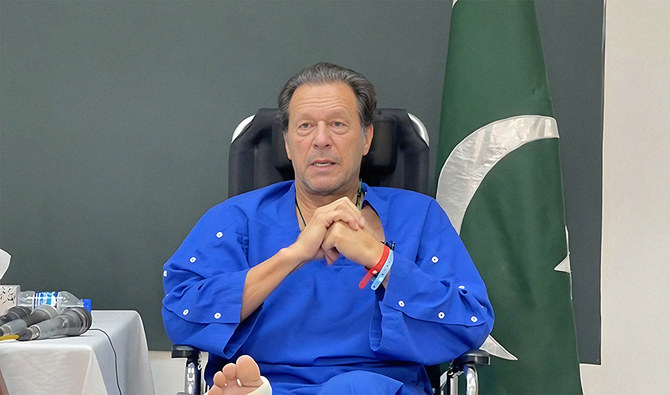ISLAMABAD: Pakistan’s former prime minister Imran Khan announced on Sunday his party would resume its protest march to Islamabad on Tuesday from the same spot in Wazirabad city where he survived an apparent bid on his life last Thursday.
Khan suspended his long march after he was wounded in a gun attack that killed one of his supporters and injured about 10 other people. He was rushed to the Shaukat Khanum Memorial Cancer Hospital in Lahore, which he built in his mother’s name in 1994, for treatment. He received four bullets, two each in his legs, when his convoy was sprayed with bullets, according to his doctors.
Addressing a news conference from the hospital with his legs bandaged, Khan said the protest march would reach Rawalpindi city in the next 10 to 14 days, depending on the speed of the caravan.
“We have decided that our march will resume on Tuesday from Wazirabad where I and eleven others were shot,” he announced, adding that he would be addressing the march daily from Lahore.
Khan said he would join the march in Rawalpindi and take it to the federal capital.
“I’ll reach Rawalpindi and lead [the rally] from there onward,” he continued.
Since his ouster from office in April in a parliamentary no-confidence vote, Khan has held massive rallies in different parts of the country to mobilize the public against the government led by Prime Minister Shehbaz Sharif. He has also been trying to force the government to announce early elections, though the government says the polls will be held on time in October next year.
Talking about the registration of case related to the shooting incident against him, he reiterated that he held three men – Prime Minister Sharif, Interior Minister Rana Sanaullah and ISI official Maj. Gen. Faisal Naseer – responsible for the attack and he had every right to nominated them in the First Information Report (FIR).
“I fully believe that these three have done this,” he said while lamenting that the Punjab police had not been registering the case on one pretext or the other.
“The Punjab police comes up with one reason or the other [for not registering the FIR],” he said. “They say, ‘You can remove us and appoint another person who can register the FIR.’”
“If I cannot get his [ISI official’s] name in the FIR, then I ask what happens to the common man here,” he continued.
Khan said he was surprised at a recent statement issued by the military media wing, ISPR, in which his statements against the ISI official were described as “unacceptable and uncalled for” in the absence of any substantial evidence. He maintained it was in the interest of the army to take action against such people.
“Have you noticed what you are saying,” Khan said. “Is there any logic to it?”
Judicial commission
Khan cautiously welcomed Prime Minister Sharif’s decision to approach the country’s top court for a judicial investigation into the gun attack, though he questioned if a “fair and transparent” probe was possible without the resignation of three people named by him who he said had hatched the assassination plot.
“I welcome this, but the first point is what will it do,” he asked. “When all the agencies come under the three men I have named, how can we have a transparent investigation.”
He recalled there was a “complete pattern” behind the attack as Sharif’s party leaders already held press conferences, saying that “I was insulting the religion.”
Khan urged the chief justice of Supreme Court to conduct judicial inquiry into the killing of journalist Arshad Sharif, the diplomatic cypher which Khan’s says was part of the foreign conspiracy to oust him from power, and the obscene video of his party’s senator Azam Swati.
“Swati has told me he would stage a sit-in outside the supreme court and other PTI senators would also follow him,” he said. “This is a defining moment. Credibility of our justice system is at stake. We will have to implement the rule of law.”
The former prime minister’s close aide, Chaudhry Fawad Hussain, later confirmed that Khan had been discharged from the hospital and was going to his residence.



















